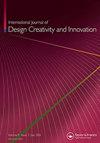Theory and practice of Design Thinking: perspectives of designers and business consultants
IF 2.5
Q4 ENGINEERING, MANUFACTURING
International Journal of Design Creativity and Innovation
Pub Date : 2021-07-03
DOI:10.1080/21650349.2021.1929501
引用次数: 3
Abstract
ABSTRACT The job of designers and business consultants features undeniable commonalities: focus on complex organizational problems, nearly constant exposure to ambiguity, difficulty in measuring performance and need to leverage knowledge and other intangible assets. Synergies between the disciplines of design and business consulting have increased in the last couple of decades. Design Thinking has emerged as an approach to solve business problems by thinking like a designer to leverage creativity and innovation. Despite its success, this has also raised some criticism: a diffused skepticism toward a public relation term that entails expensive invoices to simply apply old-fashioned creative thinking. What do the real protagonists think of Design Thinking and its application in the business world? We explored the perceptions of designers and business consultants on the theory and practice of Design Thinking. We interviewed 11 such professionals and our findings identified significant differences in perceptions around the essence, practicality and value of Design Thinking. Our research supports calls in the literature for establishing stronger connections between the principles of designerly thinking and the practice of Design Thinking in business.设计思维理论与实践:设计师与商务顾问视角
摘要:设计师和商业顾问的工作具有不可否认的共性:专注于复杂的组织问题,几乎总是暴露在歧义中,难以衡量绩效,需要利用知识和其他无形资产。在过去的几十年里,设计和商业咨询学科之间的协同作用有所增强。设计思维已经成为一种通过像设计师一样思考来利用创造力和创新来解决商业问题的方法。尽管它取得了成功,但这也引发了一些批评:人们对一个公共关系术语普遍持怀疑态度,这个术语需要昂贵的发票来简单地应用老式的创造性思维。真正的主角们对设计思维及其在商业世界中的应用有何看法?我们探讨了设计师和商业顾问对设计思维理论和实践的看法。我们采访了11位这样的专业人士,发现他们对设计思维的本质、实用性和价值的看法存在显著差异。我们的研究支持了文献中的呼吁,即在设计思维的原则和商业中的设计思维实践之间建立更牢固的联系。
本文章由计算机程序翻译,如有差异,请以英文原文为准。
求助全文
约1分钟内获得全文
求助全文
来源期刊

International Journal of Design Creativity and Innovation
ENGINEERING, MANUFACTURING-
CiteScore
3.80
自引率
27.80%
发文量
15
期刊介绍:
The International Journal of Design Creativity and Innovation is an international publication that provides a forum for discussing the nature and potential of creativity and innovation in design from both theoretical and practical perspectives. Design creativity and innovation is truly an interdisciplinary academic research field that will interest and stimulate researchers of engineering design, industrial design, architecture, art, and similar areas. The journal aims to not only promote existing research disciplines but also pioneer a new one that lies in the intermediate area between the domains of systems engineering, information technology, computer science, social science, artificial intelligence, cognitive science, psychology, philosophy, linguistics, and related fields. The journal covers, but is not restricted to, the following topics: ·Theories on Design Creativity and Innovation ·Cognition of Design Creativity ·Innovative Process ·Inventive Process ·Analogical Reasoning for Design Creativity and Innovation ·Design Synthesis ·Method and Tools for Design Creativity and Innovation ·Representation of Design Creativity and Innovation ·Education for Design Creativity and Innovation ·Concept Generation and Inspiration.
 求助内容:
求助内容: 应助结果提醒方式:
应助结果提醒方式:


